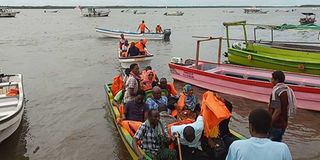Lamu boat owners fear job loss as Lapsset berths take shape

Passengers arrive on a boat in Lamu. Over 5000 boat operators in Lamu County have demanded compensation for the effects brought about by the Lapsset Corridor project. PHOTO | KALUME KAZUNGU | NATION MEDIA GROUP
What you need to know:
- They said most of their transport channels and routes are likely to be closed down once the Lapsset project begins operations.
- Mr Awadh expressed disappointment with the continued discrimination and side-lining of the Lamu boat operators.
- The fishermen refused to be given alternative compensation and instead called on the Lapsset authority to compensate them in cash.
Over 5000 boat operators in Lamu County have demanded compensation for the effects brought about by the ongoing construction of the Sh2.5 trillion Lamu Port South-Sudan-Ethiopia Transport (Lapsset) Corridor project.
The project is being set up in Kililana in Lamu West and so far construction of the first three deep sea berths is ongoing with the first berths out of the three expected to be complete by December this year.
But speaking to the Nation in Lamu, the boat operators said most of their transport channels and routes are likely to be closed down once the Lapsset project begins operations.
Boat Operators Association Chairman Hassan Awadh called on the government through the Lapsset Corridor Development Authority to ensure all the affected boat operators are fully compensated.
DISCRIMINATION
Mr Awadh expressed disappointment with the continued discrimination and side-lining of the Lamu boat operators despite the fact that their activities will also be adversely affected by the Lamu port activities.
He threatened to organise a major demonstration to push the government to consider compensating the boat operators, most of whom will be forced to abandon their trade once the port begins its activities in the area.
“We want to tell the government that it shouldn’t focus on compensating fishermen affected by the port project only. As boat operators, we are also part and parcel of those that the government must compensate.
“Our routes and channels used at the moment will be closed down once the port begins work in this region. We won’t be allowed to operate our boats together with the big ships that will be using some of our key channels. That means some of us will be forced to abandon our trade. We need compensation,” said Mr Awadh.
He said, “If the government won’t listen to our plea and compensate us, then we will be forced to down our tools and demonstrate so that our cries can be heard. We are equally affected by the Lapsset project and we need compensation.”
AL-SHABAAB
Mr Athman Musa, a coxswain in Lamu, said the water transport business has continued to dwindle in recent days following cases of suspected Al-Shabaab attacks and killings which has resulted to fewer guests touring the region in recent days.
Mr Musa said time has come for the Lapsset authority to show mercy and compensate the coxswains so that they can begin a new life.
“The boat transport business is already performing badly because of the insecurity incidences that have been witnessed in Lamu since the 2014 terror attack in Mpeketoni. If channels will be closed down because of the Lapsset, that means we will have nowhere to conduct our trade. We need compensation so that we can look for alternative ways of survival,” said Mr Musa.
Their sentiments come at a time when the Lapsset taskforce has already completed taking data on all the Lamu fishermen affected by the port project with a view to compensating them.
This month, the fishermen refused to be given alternative compensation and instead called on the Lapsset authority to compensate them in cash.





